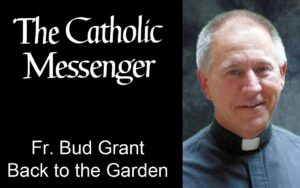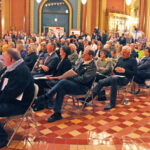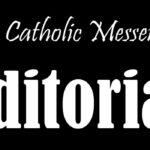By Fr. Bud Grant
As divided as it seems we are as a country, we can all perhaps agree that … we are divided. The fault lines are tediously familiar: political; economic (1-percenters, 10-percenters and the rest of us); ethical; social/cultural (same-sex marriage, gun control, gender, abortion); cultural, racial and immigrant; rural/urban; and climate change. No one really likes this state of affairs and so it is worth looking into.
 According to a pair of studies by the National Bureau of Economic Research, these aforementioned divides are “over-wrought” (Economist, “Democracy in America, July 17, 2018). It turns out that, in general, Americans have shifted rather dramatically in social ethics so that most people favor affirmative action, are pro-immigrant, pro-gay rights, pro-gun control, and most people believe that climate change is real and caused by humans. Interestingly, the only measurable divide is “ideological,” as measured by political and religious affiliation. This means that religion and politics are causing the divisions, not so much any of the other metrics mentioned above.
According to a pair of studies by the National Bureau of Economic Research, these aforementioned divides are “over-wrought” (Economist, “Democracy in America, July 17, 2018). It turns out that, in general, Americans have shifted rather dramatically in social ethics so that most people favor affirmative action, are pro-immigrant, pro-gay rights, pro-gun control, and most people believe that climate change is real and caused by humans. Interestingly, the only measurable divide is “ideological,” as measured by political and religious affiliation. This means that religion and politics are causing the divisions, not so much any of the other metrics mentioned above.
The good news is that Americans are not very ideological. Only 26 percent of Americans identify as Republican and 27 percent as Democratic, while 44 percent are independent, a divide which has oscillated within only narrow parameters since 2004 (Gallup.com). We should apply a grain of salt to polls claiming what “most” party-loyal voters are thinking — any statistic represents only a portion of a portion of Americans.
More worrisome, at least for we who believe religion to be a force for good, America is becoming less religious. While Republicans are still staunchly Christian, Democrats are less so and 24 percent of “unaffiliated” voters don’t align with any religious group (PRRI.org).
Catholicism, like all other Christian denominations, is shrinking and aging. While more than 74 percent of Americans still identify as religious, it is a bit worrisome that about a quarter of Americans — and 38 percent of young adults — may well view religion as a problem.
It is incontestable that religion has always been divisive. More Christians were killed by other Christians in the first 300 years of our existence than were killed during Roman persecutions; religion has been a factor in most violent conflicts ever since. Non-affiliated Americans associate religion — and Catholicism in particular — with intolerance, ignorance and, of course, the sins and crimes of child abuse.
Arguably, we’ve fared better than we have any right to expect in weathering historical self-inflicted crises, but we always face an existential crisis: every generation is one generation away from the demise of our community if we do not succeed in passing on the “Joy of the Gospel.” Our situation is that of the Blessed Mother and St. Joseph, nurturing the fragile Word of God in a world that doesn’t understand him and so doesn’t want him.
As a church, we have no right to gloss over our complicity in ideological divisiveness, much less our crimes. These must be faced with more honesty, humility, courage and penance than we have heretofore demonstrated. At the same time, even while we are still figuring out the full ramifications of it, we possess the Bible, the greatest manifesto of inclusiveness, justice, mercy and care for God’s creation that has ever been scribed.
If there was ever a vulnerable generation in need of this message, it is that which has grown up as “Generation Stress” (David and Lauren Hogg in “#NeverAgain,” 54). We can at once face our demons and evangelize our youth. There are three steps: first, by exhibiting faith which means letting go of stress, anxiety and unrealistic expectations but also surrendering entrenched power and the urge to self-preservation. Second, through hope, which doesn’t seek to avoid sacrifice or ignore suffering but rejoices, confident that resurrection dawns on the other side of the cross. And finally, by sacrificial loving for future generations, the poor and marginalized and the planet. We are mandated stewards in this not-so-divided world after all.
(Father Bud Grant is a professor of theology at St. Ambrose University in Davenport.)











